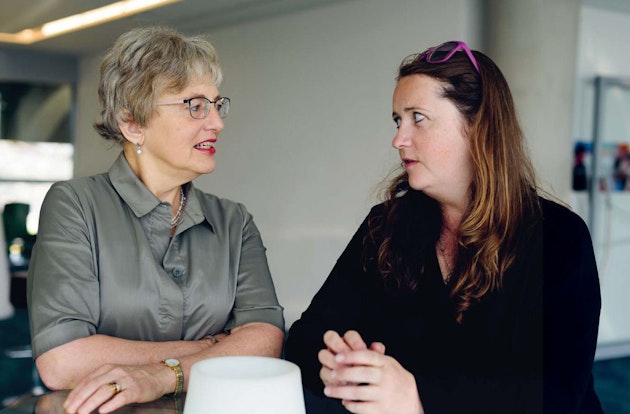27 mins
Strategic Forces
This month Ireland will cross yet another milestone when it becomes the first country in the world to publish a government strategy aimed at LGBTI+ youth. It’s the brainchild of Minister for Children and Youth Affairs, Katherine Zappone, who always envisaged the need for such a strategy but didn’t know that it would eventually fall under her remit and that she would be the one implementing it – a fact she is immensely proud of.

Photo by Babs Daly
To chair the strategy committee she appointed Irish Times journalist Una Mullally, who guided the process of bringing the whole thing to life. Speaking at the time of her appointment Mullally said she hoped to bring her “experience and work as an LGBT rights activist and advocate,” adding that the strategy would be “guided by the experts in this field, and, most importantly, LGBT young people themselves”.
With that in mind the strategy has emerged following an intense almost two-year period of consultation which placed the voices of young people at its core. According to Zappone, “We knew that it was important to offer an opportunity for their voices to surface”. In all, over 4,000 young people from across the country contributed their voices to the strategy, which will have a lifespan of three years and involve the cooperation of various governmental departments in order to achieve its objectives.
Results from the consultation process with these young people showed that a fifth of them continued to face harassment and discrimination in their schools and jobs. Concerns around non-inclusive sex education were also raised as were trans concerns around gender-neutral bathrooms and school uniform policies. However, the surveys also showed that things were getting markedly better, especially since the passing of the marriage equality referendum.
One of the big aims of the strategy is to address LGBT+ youth services nationally and make them more inclusive by providing supports and funding to tackle the gaps in rural services. According to Minister Zappone, addressing these gaps will be critical “as they’re so isolated.” She hopes that additional funds will be made available, but says there are initial funds there to kickstart the project.
“The cultural edifice of the church has really been challenged, deeply and significantly across the board.
“It is not just about identifying the actions clearly. They will also need to be resourced, particularly the regional provision of supports outside Dublin.”
A big challenge of the strategy will be to address the issue of LGBT+ rights within schools, particularly in the area of trans rights. Young people under the age of 16 are particularly vulnerable as they are unable to legally assert their gender identity and attain associated protections. Only 26 per cent of trans people say that their school recognises their gender identity and this can cause a myriad of problems ranging from issues around uniforms, toilets and changing facilities.
Zappone admits that some of the implementation around this may be challenging for some of the schools, given their ethos. The church’s patronage of schools and their hostility to LGBT+ rights was something that came up in the consultations, particularly in the area of sex education. However she is keen to stress that in a social climate that’s rapidly evolving she is optimistic that an appetite for change exists both socially and within government.
“Our post-repeal era really supports this kind of implementation. The cultural edifice of the church has really been challenged deeply and significantly across the board. All of the stuff around uniforms and inclusivity will be dealt with in the strategy. These are practical day-to-day things which impinge upon people’s daily experience. All of the things that young people raised emerge as actions within the strategy.”
The cooperation of the other government departments will be key to the success of this strategy and both Zappone and Mullally emphasise that there is massive buy-in from the departments from the get-go, particularly the Department of Education, which had two representatives assigned to the oversight committee. Mulally says “the buy-in is there and all of the actions we take will be in collaboration with the Department of Education, so that’s where the strategy’s strength is. Instead of being instructive about things and going to the relevant government departments and saying you have to do things, there is buy-in from the start.
“When we started out there were various things that young people were raising, which have ended up happening, like sex education and LGBT inclusion. When we started out PrEP was not available at all. Now there’s limited availability, and that’s addressed in the report. Repeal the 8th was raised consistently in the consultation process and that has happened. These things occurring simultaneously adds to an atmosphere where there is a movement which embraces change.”
While the specific actions cascading from the strategy will be outlined at its launch on the eve of this year’s Dublin Pride march, Mullally says that every action is rooted with the overriding aim that “every young LGBTI person faces no barriers based on their gender and sexual identity. That’s the big picture stuff. That any young person who is growing up in Ireland does not fall victim to any kind of barrier because of who they are.”
The National LGBTI+ Youth Strategy will be launched on June 29